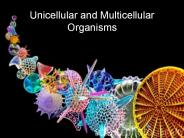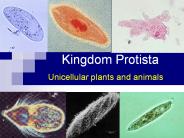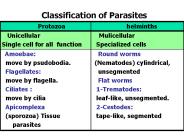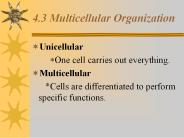Unicellular PowerPoint PPT Presentations
All Time
Recommended
A particular species of a unicellular organism inhabits the intestines of termites, where the unicellular organisms are protected from predators.
| PowerPoint PPT presentation | free to view
Unicellular Organisms Most living organisms are composed of millions of cells. They are multicellular. Some living organisms are unicellular which means that they ...
| PowerPoint PPT presentation | free to view
Unicellular and Multicellular Organisms Unicellular Organisms Unicellular organism are one celled living things. Algae are one celled organisms that contain ...
| PowerPoint PPT presentation | free to download
Unicellular Organisms Unicellular Organisms Most living organisms are composed of millions of cells. They are multicellular. Some living organisms are unicellular ...
| PowerPoint PPT presentation | free to view
What Have We Learned From Unicellular Genomes? Propionibacterium acnes Bacteroides thetaiotaomicron Mycoplasma genitalium Mimivirus Cyanobacteria Plasmodium
| PowerPoint PPT presentation | free to download
Pseudopods false foot- cytoplasmic streaming. phagocytosis-engulf food with a vacuole ... Volvox a collonial green algae. Chlorophyta. Funguslike Protists ...
| PowerPoint PPT presentation | free to view
Phylogenetic relationships between unicellular aquatic organisms
| PowerPoint PPT presentation | free to view
Mitosis, Significance to unicellular and multicellular organisms, Chromosomes Significance of cell reproduction to multicellular & unicellular organisms 2.
| PowerPoint PPT presentation | free to view
Responsible for acne, its genome sequenced in 2004. ... Anatomy of acne. Propionibacterium acnes genome. Sequenced ... 12% encoded RNA products (rRNA and tRNA) ...
| PowerPoint PPT presentation | free to download
Higher Biology Cells Mr G Davidson Unicellular Organisms Unicellular organisms consist of only one cell and include animals and plants. In order to survive, these ...
| PowerPoint PPT presentation | free to view
Process whereby all living organisms produce offspring. ... A long, threadlike appendage, especially a whip like extension of certain cells ...
| PowerPoint PPT presentation | free to view
... present in Pyramica Roger and Strumigenys Smith (Formicidae: Dacetini), but the ... ornata (Mayr), P. reflexa (Wesson & Wesson), and P. rostrata (Emery), which ...
| PowerPoint PPT presentation | free to download
... Animal-like, microscopic, unicellular (protozoans) Plant-like, microscopic, unicellular (microalgae, phytoplankton) Plant-like, macro, mostly multicellular ...
| PowerPoint PPT presentation | free to view
Introduction to Cells Unit 4 Unicellular or multicellular Leaf Cells Eukaryotic or prokaryotic? Unicellular or multicellular Protists Eukaryotic or prokaryotic?
| PowerPoint PPT presentation | free to view
Introduction to Biology Unit 4 7. Unicellular or Multicellular Leaf Cells Eukaryotic or Prokaryotic? 8. Unicellular or Multicellular Protists Eukaryotic or ...
| PowerPoint PPT presentation | free to view
Introduction to Cells Unit 4 Unicellular or multicellular Onion Root Cells Eukaryotic or prokaryotic Unicellular or multicellular? Athlete s Foot Fungus Eukaryotic ...
| PowerPoint PPT presentation | free to view
Introduction to Biology Unit 4 8. Unicellular or Multicellular Protists Eukaryotic or Prokaryotic? Did You Answer Correctly? E. coli bacteria cells = unicellular ...
| PowerPoint PPT presentation | free to download
Kingdom Protista Unicellular plants and animals General Information Protista, from the Greek protistos = first Diverse group Aka Algae & Protozoa Most are Unicellular ...
| PowerPoint PPT presentation | free to download
Diversity of Cellular Life Unicellular vs. Multicellular Organisms Unicellular Organisms The cell IS the organism Protists and Bacteria They grow, reproduce, respond ...
| PowerPoint PPT presentation | free to download
Diversity of Cellular Life Unicellular vs. Multicellular Organisms Unicellular Organisms The cell IS the organism Protists and Bacteria They grow, reproduce, respond ...
| PowerPoint PPT presentation | free to download
Kingdom Protista Unicellular plants and animals General Information Protista, from the Greek protistos = first Diverse group Aka Algae & Protozoa Most are Unicellular ...
| PowerPoint PPT presentation | free to download
Protists are unicellular organisms that have a nucleus. Kingdom: Protista * * * * Similar to Bacteria Unicellular One of the first groups of living things on Earth.
| PowerPoint PPT presentation | free to download
Many organisms, especially unicellular organisms, reproduce by means of cell division called asexual reproduction Ex: bacteria
| PowerPoint PPT presentation | free to view
KINGDOM ARCHEABACTERIA Unicellular Prokaryotes Extremophiles (heat, salinity, acid, etc) Autotrophic/chemosynthetic and heterotrophic DNA structure similar to ...
| PowerPoint PPT presentation | free to view
Fungus Characteristics -eukaryotic cells - multicellular / unicellular (yeast) - heterotrophs : many are decomposers Structures - hyphae : basic unit of multicellular ...
| PowerPoint PPT presentation | free to view
Classification of Parasites helminths Protozoa Mulicellular Specialized cells Unicellular Single cell for all function Round worms (Nematodes) cylindrical,
| PowerPoint PPT presentation | free to download
CLASSIFICATION OF PARASITES PROTOZOA HELMINTHS Unicellular Single cell for all functions Multicellular Specialized cells 1:Aoebae: move by pseudopodia.
| PowerPoint PPT presentation | free to download
Kingdoms protista, fungi, plantae, animalia Protista Unicellular Some autotrophic-algae Some heterotrophic Mostly found in aquatic habitats Endosymbionts live ...
| PowerPoint PPT presentation | free to view
Puccinia Uredo- sporangium Puccinia Uredo-sporangium-Wheat Uredospore are stalked, unicellular oval, binucleate structures, rusty red in colour.
| PowerPoint PPT presentation | free to download
Taxonomy and Classification The Six Kingdoms Archaebacteria Prokaryotic Unicellular Reproduces asexually Heterotrophic, but sometimes autotrophic Heterotrophic ...
| PowerPoint PPT presentation | free to download
Chapter 11 Protists Protist Charateristics Protists unicellular or multicellular eukaryotes that may be autotrophic or heterotrophic Autotrophs are organism ...
| PowerPoint PPT presentation | free to view
Kingdom Protista Chlamydomonas are actually unicellular and flagellated. Fungus-like protists, Myxomycota and Oomycota are decomposers. Phylum Myxomycota are made up ...
| PowerPoint PPT presentation | free to view
Introduction to Parasitic Protozoa Not classified under Kingdom Animalia but under Kingdom Protista Main feature is they are unicellular eukaryotes
| PowerPoint PPT presentation | free to view
The Protozoans Ciliates Amoeboid Protozoans Flagellated Protozoans Kingdom Protozoa Defining Characteristics All are unicellular eukaryotes What is a prokaryote?
| PowerPoint PPT presentation | free to view
Classification Go to Section: Kingdom Eubacteria Go to Section: E. coli Streptococcus Cell Type Prokaryote Number of Cells Unicellular Nutrition Autotroph or ...
| PowerPoint PPT presentation | free to view
patterns of organization 1. asymmetrical, radial, or bilateral 2. unicellular, diploblastic, or triploblastic 3. acoelomate, psuedocoelomate, or coelomate
| PowerPoint PPT presentation | free to download
Protists! General Characteristics eukaryotic cells contain membrane-bound nuclei and other membrane-bound organelles can have unicellular, colonial and ...
| PowerPoint PPT presentation | free to download
4.3 Multicellular Organization Unicellular *One cell carries out everything. Multicellular *Cells are differentiated to perform specific functions.
| PowerPoint PPT presentation | free to download
Six Kingdoms Fungi Zombie Fungus Important Characteristics Eukaryotes (have a nucleus) Mostly multicellular (unicellular = yeasts) Use spores to reproduce ...
| PowerPoint PPT presentation | free to view
Classification of the Five Kingdoms Overview after Ward s Taxonomy Activity Kingdom Monera -Prokaryotic -Unicellular -No sense organs Bacteria Absorptive ...
| PowerPoint PPT presentation | free to view
Kingdom Protista Chlamydomonas are actually unicellular and flagellated. Fungus-like protists, Myxomycota and Oomycota are decomposers. Phylum Myxomycota are made up ...
| PowerPoint PPT presentation | free to view
Mutualists (bacteria and host both benefit) Unicellular, colonial, filamentous ... phototaxis: movement toward light. chemotaxis: movement to chemicals ...
| PowerPoint PPT presentation | free to download
A: Discovery Channel LIFE Scientific name = Dionaea muscipula Kingdoms! Biology 11 Eubacteria Prokaryotic Autotrophs and Heterotrophs Unicellular Some capable of ...
| PowerPoint PPT presentation | free to view
All parasitic organisms are eukaryotes. Protozoa: unicellular organisms, ... Metazoa: multicellular organisms, e.g. helminths (worms) and arthropods (ticks, lice). An .
| PowerPoint PPT presentation | free to view
... Moist Environments Phylum Acrasiomycota Cellular Slime Mold No cell wall Unicellular but colonize Phylum Myxomycota Acellular Slime Mold Fuse together to ...
| PowerPoint PPT presentation | free to download
... of Living Things Made of Cells unicellular vs.. multicellular Red Blood cells Onion skin epidermal cells Human ... reproduction: - asexual ... human beings 2 ...
| PowerPoint PPT presentation | free to download
Asexual Reproduction 1. Cell Division - Amoebas Asexual Reproduction Mitosis Amoeba unicellular protozoan Every three days grows large enough to divide No ...
| PowerPoint PPT presentation | free to download
Chapter 20 - Protists Characteristics: Eukaryotic Unicellular - may be colonial or filamentous (Spirogyra and Volvox) Animal-like, Plant-like, or Fungus-like ...
| PowerPoint PPT presentation | free to view
Fungi Basic Information: Fungi are... - eukaryotes - mostly multicellular - sometimes unicellular (yeast) - very diverse with an estimated 1.5 million species ...
| PowerPoint PPT presentation | free to view
Chapter 3 Lesson 2 How do unicellular and multicellular organisms differ? How does cell differentiation lead to the organization within a multicellular organism?
| PowerPoint PPT presentation | free to download
Microorganisms have an essential role in life processes and cycles on Earth. What are microorganisms? Microorganisms Unicellular Prokaryotic Microbes Typically ...
| PowerPoint PPT presentation | free to download
Chromosomes PART 1 Honors Genetics Ms. Gaynor Why is Cell Division Important? Unicellular organisms Reproduce by cell division increasing the population.
| PowerPoint PPT presentation | free to view
PROTISTS Protists Protists: Unicellular eukaryotic organisms. Over 115,000 species Eukaryotic cells - contain membrane-bound organelles (particularly mitichondria ...
| PowerPoint PPT presentation | free to download
Ch. 19 Bacteria Notes Review: Kingdom Eubacteria and Archaebacteria; Old Kingdom = Monera Unicellular Prokaryotic, no cellular membranes, no nucleus Auto and ...
| PowerPoint PPT presentation | free to download
Kingdom Protista Characteristics Algaelike or plantlike Protozoa or Animallike Funguslike Unicellular Multicellular Eukaryotes
| PowerPoint PPT presentation | free to view
Protists Protist Characteristics Live in water Eukaryotic Most are unicellular, some are multicellular (algae) Protist Characteristics Some are autotrophic (can make ...
| PowerPoint PPT presentation | free to download
























































